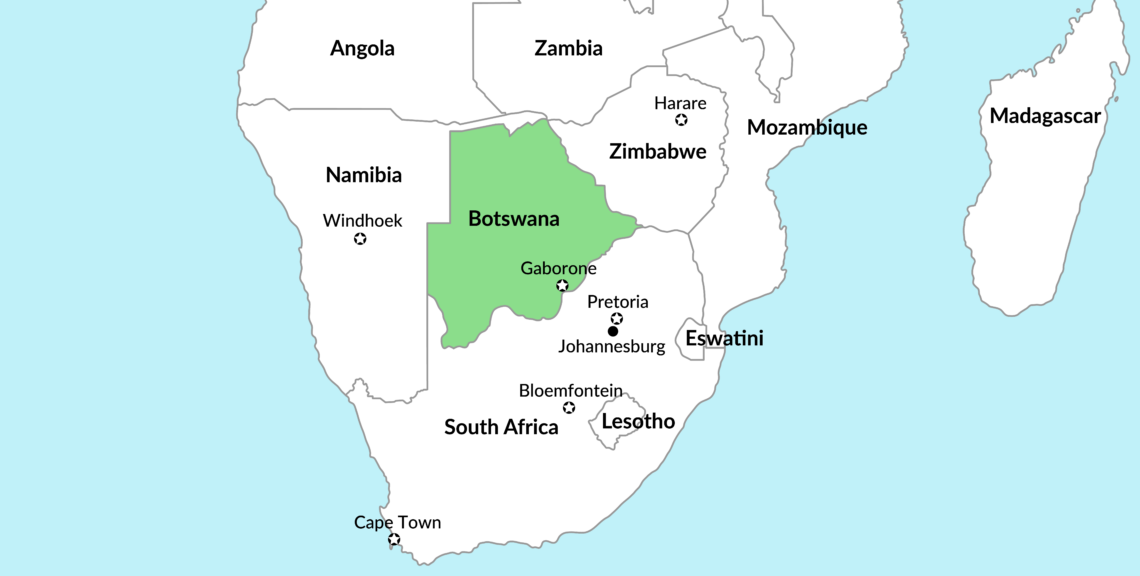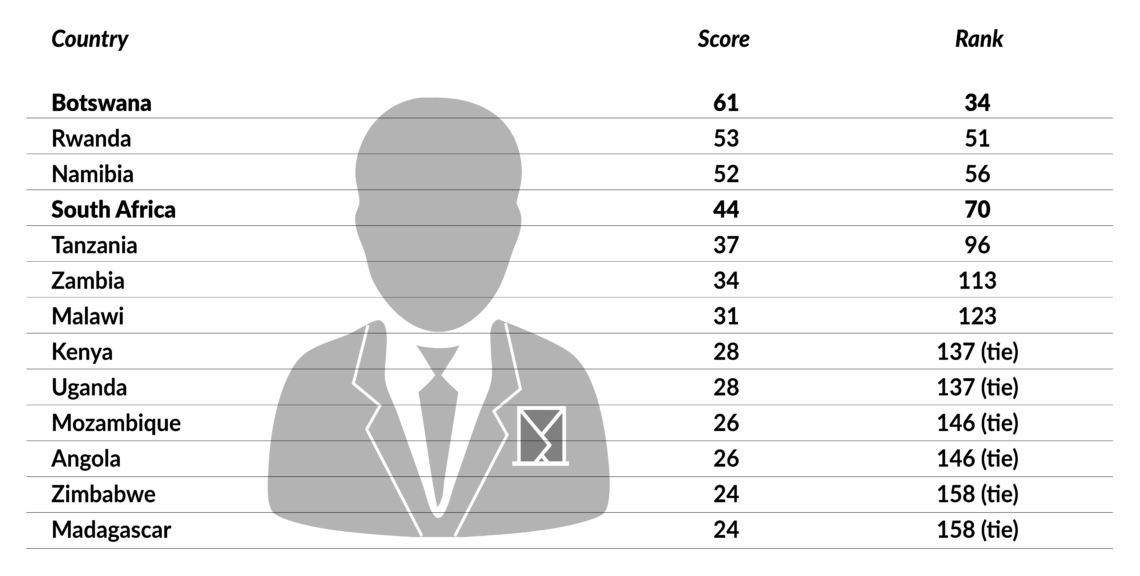Relations between Botswana and South Africa have become tense after the former hired an advocacy group to sue the latter’s courts over millions of allegedly laundered dollars. Botswana hopes to raise its regional clout, but both countries may lose out in the end.
 Botswana’s population (2.3 million) is far smaller than South Africa’s (58 million), and its economy is dependent on its southern neighbor. Nevertheless, its stability has helped it stand out within the region. © macpixxel for GIS
Botswana’s population (2.3 million) is far smaller than South Africa’s (58 million), and its economy is dependent on its southern neighbor. Nevertheless, its stability has helped it stand out within the region. © macpixxel for GIS
×In a nutshell
Governance in South Africa is deterioratingBotswana wants to keep Pretoria from meddling in its politicsA money-laundering case is straining the countries’ ties
In an unprecedented move that could shake regional relations, the government of Botswana enlisted a private prosecutor to help it track $48 million allegedly laundered into South Africa.
The story initially revolved around South African influence in Botswana’s internal politics. South African businesswoman Bridgette Motsepe-Radebe – sister of billionaire mining magnate Patrice Motsepe and South Africa’s First Lady Tshepo Motsepe – was identified as a cosignatory on two bank accounts into which money was allegedly funneled to finance a coup in Botswana.
The wealthy Motsepe family has long had political connections. Ms. Motsepe-Radebe’s husband, Jeff Radebe, had served as a cabinet member in every South African presidential administration since 1994 – all under the African National Congress (ANC) party.
×Facts & figures
Private prosecution
In most countries, state prosecutors decide whether to prosecute a case. People who believe they have been wronged may never end up seeing their case go before a court.
Many countries, however, allow private prosecutions. Under South African law, private prosecution is a statutory right – meaning any person can conduct a prosecution in the appropriate court.
There are limits as to the number of people who can prosecute a charge and who can launch and conduct such a prosecution. For example, someone can only pursue a private prosecution if they can prove substantial interest in a matter.
It was also alleged that Ms. Motsepe-Radebe and former Botswana President Ian Khama were having an affair. Former President Khama is the son of Seretse Khama, who founded the Botswana Democratic Party (BDP), the country’s dominant political force. The BDP has ruled Botswana since its independence from Britain in 1966.
Close ties
Botswana has friendly relations with South Africa, evinced by the countries’ strong diplomatic ties. Botswana hosted ANC activists during South Africa’s apartheid years in the second half of the 20th century. Both the BDP and ANC fought for liberation in their countries. What sets them apart now, however, is that the BDP governs a stable state, while the ANC is struggling to maintain control over South Africa.
Ravaged by corruption under former President Jacob Zuma’s nine-year administration, South Africa remains wobbly compared to Botswana, even though the latter has a tiny population (2.3 million) and an economy dependent on the former. Institutions are degenerating in South Africa, affecting the state’s ability to provide basic services. Botswana, on the other hand, consistently enjoys a reputation as one of the least corrupt countries in Africa.
According to the latest Transparency International Corruption Perceptions Index, Botswana achieved a score of 61 points out of 100; with 100 representing the cleanest government. That put it in 34th place among 180 countries. In the same report, South Africa received 44 points, putting it in 70th place.
×Facts & figures Among countries in Southern Africa, Botswana scores at the top for corruption perceptions. © macpixxel for GIS
Among countries in Southern Africa, Botswana scores at the top for corruption perceptions. © macpixxel for GIS
Though Botswana is stable, it is a multiparty democracy in name only. No opposition party has won elections there since independence in 1966. The only serious challenger emerged recently, when former President Khama surprised the political establishment by backing the opposition. This followed a peaceful and orderly transition in which he handed over power to current President Mokgweetsi Masisi.
Since his departure from office after his second term ended in 2018, President Khama began denouncing his former party – the party that his father had founded. In 2019, he helped form an opposition group called the Botswana Patriotic Front (BPF). This caused political tremors that reverberated throughout the region. So much so, in fact, that it may have convinced powerful South Africans to get involved in Botswana’s internal politics.
Shaky rule of law
The issue escalated when it was announced that the government of Botswana had enlisted South African self-styled civil rights organization, AfriForum, to undertake private prosecution in South African courts to recover the $48 million allegedly laundered into South African banks.
AfriForum is a South African nongovernmental organization known for litigating on behalf of the country’s Afrikaner minority. Its ideology stands diametrically opposed to the progressive-liberation policies pursued by the ANC-led government. The organization frequently pursues legal matters that the state seems reluctant to take up for political reasons.
Botswana has enlisted a South African-based nongovernmental organization with right-wing sympathies to recover its money in South African banks because it has no confidence that Pretoria can enforce its own laws. The move also implies a belief that there are powerful businesspeople in South Africa who might frustrate the investigations by using their political connections.
The political dialogue in South Africa is fraught with mistrust between leaders and voters. The key challenge is corruption.
The political dialogue in South Africa is fraught with mistrust between leaders and voters. The key challenge is corruption, which voters see is undermining democratic institutions and the rule of law. Besides concerns about how corruption and maladministration undermine state capacity, South Africans have begun confronting a complex problem found in many democracies: the use of illicit money to influence political outcomes. The push for transparency is at the forefront of the electoral reform agenda in South Africa.
President Cyril Ramaphosa’s campaign to wrest control of the ANC from allies of former President Jacob Zuma attracted large donations from well-established businesspeople in South Africa, sparking a public backlash over how the rich unduly influence policy to the detriment of the poor and the vulnerable. The message to South Africa in this regard is simple: do not corrupt Botswana’s political system.
Gaborone’s move has implications on South Africa’s standing and its ability to promote political stability and good governance in the region. If Pretoria itself is not seen as upholding the rule of law, its role as a regional leader in building stable democracies with good governance will be undermined.
Breaking ranks
The gradual collapse of governance in South Africa is undermining its image as the region’s champion for the rule of law and democracy. Evidence of the failings pervades the South African press, with reports of corruption becoming as frequent as daily weather reports. Botswana, in refusing to trust South Africa’s public prosecution system, has made a clear point that Pretoria has lost its clout – and is positioning itself to take a leadership role in the region.
Botswana has broken ranks with Pretoria on regional matters before. For example, it criticized late Zimbabwean President Robert Mugabe’s controversial land reform agenda, calling it a “land grab.” South Africa was silent on the matter, tacitly approving Mugabe’s program.
By enlisting AfriForum, Botswana is getting back at the ANC-led government.
By enlisting AfriForum, Botswana is also getting back at the ANC-led government. If South Africa allows influential political figures to infiltrate Botswana’s internal politics, then Gaborone will retaliate by embarrassing Pretoria.
All this makes clear how corruption has permeated throughout South African institutions under the ANC-led government. President Ramaphosa is currently chair of the African Union at a time when many in his country see corruption as even more dangerous than the health crisis brought on by the Covid-19 pandemic. Botswana is piling on, expressing its lack of trust in South Africa’s ability to enforce the law.
×
Scenarios
Relations between Botswana and South Africa could deteriorate as both come out of the current standoff weaker. The courts in South Africa are independent; they will not allow the National Prosecution Authority to avoid the matter. If the South African authorities conclude that there is no merit to the money-laundering allegations, that decision can be reviewed in court and overturned. The courts have made similar decisions before: for example, ruling to reinstate formerly dismissed charges against President Zuma.
So, if Botswana presents credible evidence, the matter will be taken up in South African courts, with or without Pretoria’s cooperation. However, the South African government will likely allow state agencies to undertake prosecution if the charges have merit. It is better for Pretoria to be a reluctant litigant than to allow a private organization to take the lead in a case that affects national security. South Africa has since sent an envoy to Botswana to de-escalate the controversy and consider how it can be addressed amicably between the two countries.
However, if a trial goes forward and the case reveals compromising details involving well-connected South Africans and their counterparts in Botswana, it will have implications for the entire region.
Botswana’s President Masisi is consolidating his power, a process that will likely entail unraveling controversial deals made under President Khama’s administration. The fallout between the protege, Mr. Masisi, and the mentor, Mr. Khama, could increase tensions between Gaborone and Pretoria.
President Masisi has promised to reduce corruption in Botswana. Pretoria is struggling to get a handle on graft. This difference will inform the two countries’ relations on a range of regional issues, particularly the rule of law. If pursued in South African courts, the Botswana money-laundering case could shift the region’s balance of power.
Source link : https://www.gisreportsonline.com/r/botswana-south-africa-relations/
Author :
Publish date : 2020-08-11 07:00:00
Copyright for syndicated content belongs to the linked Source.





